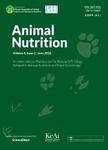The role of seaweed as a potential dietary supplementation for enteric methane mitigation in ruminants: Challenges and opportunities
The role of seaweed as a potential dietary supplementation for enteric methane mitigation in ruminants: Challenges and opportunities作者机构:College of AgricultureEnvironment and Nutrition SciencesTuskegee UniversityTuskegeeAL 36088USA United States Department of Agriculture(USDA)Agriculture Research Service(ARS)2300 Experiment Station Dr.BushlandTX 79012USA Department of Animal and Food SciencesTexas Tech UniversityLubbockTX 79409USA Symbrosia IncKailua-KonaHI 96740USA
出 版 物:《Animal Nutrition》 (动物营养(英文版))
年 卷 期:2021年第7卷第4期
页 面:1371-1387页
核心收录:
学科分类:090502[农学-动物营养与饲料科学] 0905[农学-畜牧学] 09[农学]
主 题:Seaweed Bromoform Methane Phlorotannins Ruminant Cattle
摘 要:Seaweeds are macroalgae,which can be of many different morphologies,sizes,colors,and chemical *** include brown,red,and green *** seaweeds have been more investigated and exploited in comparison to other seaweed types for their use in animal feeding studies due to their large sizes and ease of *** in vitro and in vivo studies suggest that plant secondary compound-containing seaweeds(e.g.,halogenated compounds,phlorotannins,etc.)have the potential to mitigate enteric methane(CH_(4))emissions from ruminants when added to the diets of beef and dairy *** seaweeds including Asparagopsis *** rich in crude protein and halogenated compounds compared to brown and green *** halogenated-containing red seaweeds are used as the active ingredient in ruminant diets,bromoform concentration can be used as an indicator of antimethanogenic ***-containing brown seaweed has also the potential to decrease CH_(4) ***,numerous studies examined the possible anti-methanogenic effects of marine seaweeds with inconsistent *** work reviews existing data associated with seaweeds and in vitro and in vivo rumen fermentation,animal performance,and enteric CH4 emissions in *** understanding of the seaweed supplementation related to rumen fermentation and its effect on animal performance and CH_(4) emissions in ruminants may lead to novel strategies aimed at reducing greenhouse gas emissions while improving animal productivity.



